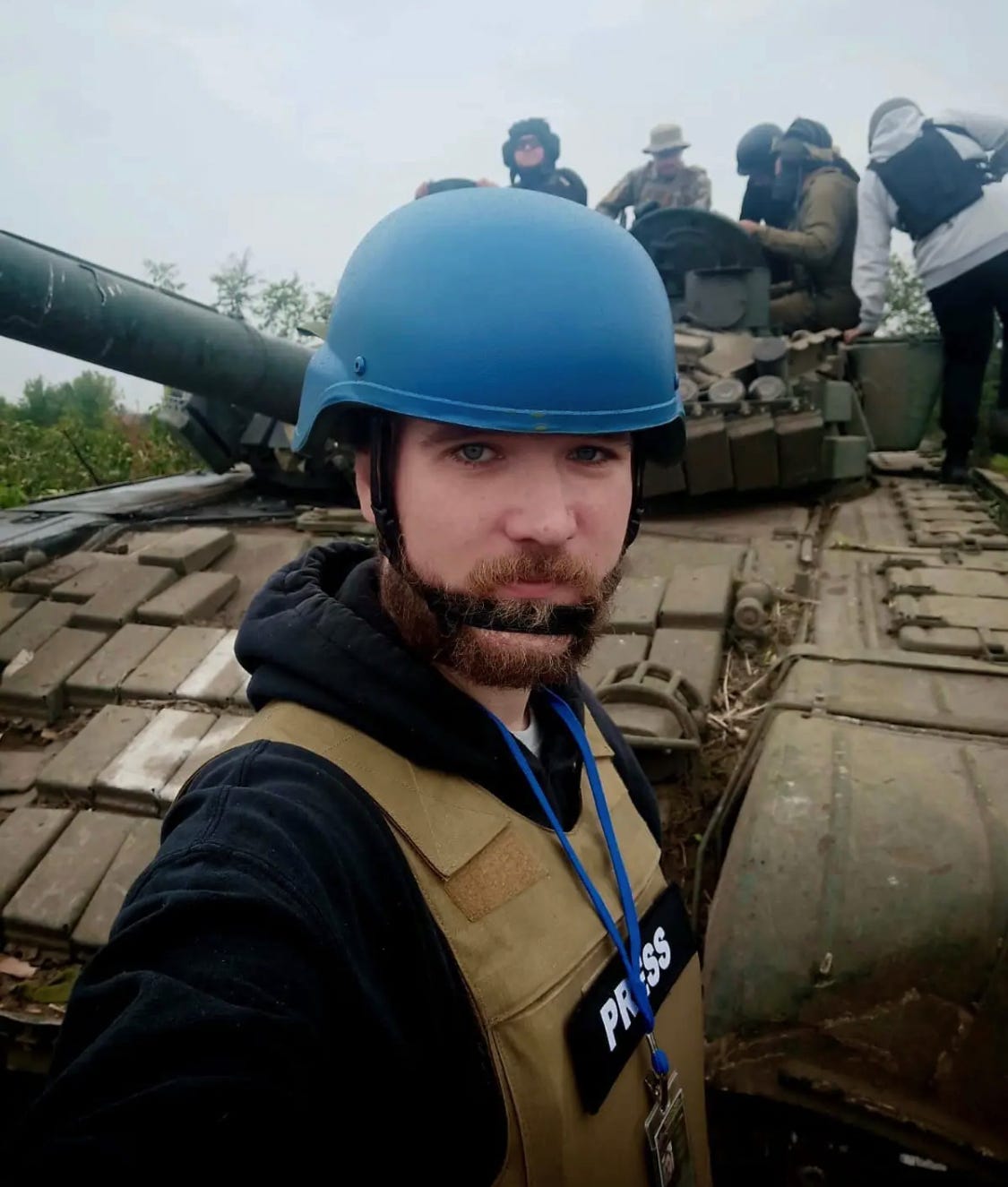The True Darkness of Cancel Culture
Online mobs, murderous dictators, and the continuum of violence.
Jamie Paul here. This post is by Contributor Alexander von Sternberg, but I also have a new piece in Queer Majority: “Banning Anne Frank’s Diary, in the Name of Freedom.”
History podcasting doesn’t exactly spring to mind when thinking about things that inspire intense controversy. As a relatively niche genre, it often flies under the cultural radar. But the world of history podcasting has found itself in the crosshairs in a way that highlights the true darkness that lies beneath the surface of what is tritely called “cancel culture.” The popular conception of cancel culture involves public figures losing jobs because they said or did something deemed offensive. To be sure, that’s certainly how most of the cases that filter down to us manifest. But cancel culture is more than its most high-profile flashpoints. Fundamentally, it’s a mentality. The same mentality that drives unhinged people to murder their opponents. The same mentality that almost got Kristaps Andrejsons killed.
It helps to first look at cancellation from the standpoint of the canceler. Take, for example, the recent kerfuffle that happened on Twitter between Hardcore History’s Dan Carlin and a handful of self-appointed advocates for the indigenous tribal peoples of North America. The context of the pile-on — that Carlin had somehow been insensitive toward indigenous peoples in a March 2023 episode (he wasn’t) — matters less than the progression of the arguments. The individual who initially criticized the episode was clearly upset, but their phrasing was mild. This, in turn, signaled to Carlin, as it would any reasonable person, that he was free to disagree with their interpretation. This led to people ganging up to attack Carlin’s character rather than his points, with various activist-types berating him for his supposed condescension, dismissiveness, and racism. As a fellow history podcaster and longtime fan of Carlin’s, I couldn’t resist jumping in to defend him against such bad faith smears. I likely only made it worse by getting involved, but the firestorm eventually blew over, and the whole ordeal helped illuminate the formula followed by would-be cancelers.
When disagreements turn into attacks on one’s person rather than their arguments, it starts the interaction down a very dark path. This is because the battle is now no longer about the statements made or ideas expressed: it’s about the people who made them. Authoritarians know that you can’t “cancel” an idea — but you can “cancel” a person. One need not even be consciously aware of this to put it into action. Sure, an idea can be disproven or at least challenged, but that’s difficult and requires us to face the possibility that we might not be able to change anyone’s mind, or that we might end up looking foolish. And even once refuted, an idea can still live on indefinitely and continue cropping up. Making the person the problem is so much easier.
What happens, then, when the person doesn’t allow themselves to be cowed into submission? What happens when they continue to stand up for themselves? Where does this eventually go, if it doesn’t just fizzle out?
…
On February 20th, 2023, my friend Kristaps Andrejsons, a Latvian journalist and historian who hosts the Eastern Border podcast, was sitting in his car when an explosion went off. The blast drove shrapnel deep into his body, and he was rushed into surgery to remove shards of glass from his legs. Thanks to the drugs his doctors administered, he was able to endure the agony, though a large number of tiny glass splinters, undetectable to X-rays, remain deeply embedded, and will cause him lasting physical pain for the rest of his life.
Kristaps relayed this horrifying news to me on Facebook messenger. At the time, he requested I not share too many details. I put out a tweet notifying our shared followers (as well as those of Daniele Bolelli from the History on Fire podcast, and the aforementioned Dan Carlin) simply stating that something had happened to him and that he was injured. In his messages to me, he was concerned for his safety and health, anxious about the surgery, and in a state of total distress.
The reality of the situation took a while to sink in for me. A fellow podcaster, and a friend, was almost killed in his own country. He might never walk again. He might even die. But why? I knew perfectly well, but it took a good night’s sleep for me to fully appreciate what had happened. My friend has never censored himself in expressing his views on the Russo-Ukrainian War and the Vladimir Putin regime, and it had almost cost him his life. Kristaps told me that Russian government sympathizers (and perhaps operatives) have made threats against him before, but anyone on the internet knows that death threats and real-life murder attempts don’t often correlate. And yet, in this case, they did. The obvious-yet-unthinkable realization dropped on me like a ton of bricks: my friend had been the target of an assassination attempt. (Since both he and I appreciate irony, we later had a good laugh about how we’d discussed that subject only a few months before on my own show.)
For many years, Kristaps has covered Soviet-era Eastern European history, with topics ranging from Soviet humor to a long-running biographical series on Joseph Stalin. When Russia invaded Ukraine in February of 2022, however, everything changed. Kristaps’s show largely became a war podcast, publishing frequent, sometimes daily updates on war’s progression. Putin’s imperialist invasion took much of the world by surprise, but Kristaps had been predicting Russian military aggression of this sort since 2017. Thanks to his fluency in Russian (as well as English and his native Latvian) and his intricate knowledge Russian political ideology, Kristaps has become something of an expert on all things Eastern European and Russian in the Anglophone podcasting sphere. Operating in a region of the world with low press freedom and few avenues of reliable information, he has also become a trusted news source for many.
Kristaps was well-aware of Putin’s mindset and the propaganda driving his autocracy. Growing up in a Baltic state whose people have very long — and not fond — memories of Russian involvement in their affairs, he was no fan of what he was hearing and seeing, to say the least. And, being a podcaster with a great love for the iconoclastic American journalist Hunter S. Thompson, he wasn’t about to keep his mouth shut about it. Unsurprisingly, this has made him a few enemies over the years, namely in Russia. This antagonism increased over time, including Kristaps once being thrown into a Russian prison for nearly a week for the heinous crime of… not having the correct papers.
When Russian forces invaded Ukraine in early 2022, Kristaps — who, like many of his fellow Baltic citizens, saw Russian aggression in understandably existential terms — took the gloves off, taking aim at everyone in the Putin regime up to and including Vladimir himself. As he watched colleagues, friends, and even family members die in the fighting, Kristaps’s pugilistic nerves of steel only intensified. His targets of condemnation included everyone from Russian nationalist hardliner Igor Girkin (someone who thinks that Putin doesn’t go far enough and who Kristaps calls his “favorite nemesis”), to Putin’s low-key guru Aleksandr Dugin, to diet-Noam-Chomsky contrarians like Michael Tracey. However, no one has found themselves on the receiving end of his ire more than the Wagner Group, a Russian paramilitary organization officially designated a “military contractor.”
To call the Wagner Group, founded in 2014 by oligarch and restaurateur Yevegeny Prigozhin, a “military contractor” is at best a euphemism. More accurately, it’s Vladimir Putin’s private army, owned by his buddy and confidant — known as “Putin’s chef” — Prigozhin. Kristaps has described it in more historical terms, as “Prigozhin’s levy”, referencing the medieval conscription practiced by 16th century Russia known as “opolchenie”, or a “people’s militia.” In other words, serving at the pleasure of the Tsar, or Vozhd during the Soviet years, or today, the oligarchs (who serve Putin).
Kristaps expounded to me that, “[‘Private army’] would be the most correct term. They have a deep reliance on the Russian state, they have tanks and aircrafts, [but] they’re not military contractors in any legal sense of the word.”
Wagner is not unique; Kristaps noted that there are at least three other “military ‘merc’ units, each owned by a different oligarch.” All of these groups are technically illegal and considered unconstitutional under Russian law, yet they brazenly operate out in the open, showing how little regard there is for legal restrictions within Putin’s Russia. According to Russian economists like Dmitry Potapenko, Russia has essentially regressed to its old feudal ways, giving us a preview of what a neo-feudalist state would look like. This includes brutal conscription practices and massive amounts of corruption which enable moves such as Wagner purchasing1 (through institutional bribery) 300 mobilized infantry units from the military apparatus to be used as cannon fodder in their operations, according to Kristaps.
This background explains why someone like Kristaps — who categorically supports Ukrainian independence — would launch such criticism at Wagner. Consequently, it explains not only why they and their allies hold so much contempt for Kristaps, but why he was almost assassinated by three individuals allegedly associated with Wagner. Two of them, Kristaps has been told by investigators, have been apprehended by Latvian authorities, while one was able to escape the country. Given Kristaps’s status as a public figure within Latvia, and the ongoing war, the incident became a matter of state security, and further details of the investigation and arrests have been withheld by authorities.
Now that the dust has essentially settled, and Kristaps has made as full a recovery as he’s likely to, it leaves us history podcasters in a strange place. The vast majority of us never have to deal with anything worse than annoying tweets and abusive comments on Reddit — usually people calling us fascists or communists (depending), and trying to demonstrate how wrong we are about the subject of the episode in question. Trying to discredit people is not necessarily “cancel culture”, but that’s where it begins. The question is, what happens if someone can’t be discredited? What if they are not only saying things inconvenient for your political cause — say, Russian imperialism — but they’re not stopping? What if this person speaking out against your movement is within your reach?
The conventional wisdom regarding cancel culture — that eventually “the mob” will move on to their next cruelty — is defensible because that’s usually what happens. However, there’s a reason why the statistical outliers are so jarring and even terrifying to those of us watching. There are billions of people; even an infinitesimal percentage of lunatics amounts to a worrying number in absolute terms. Hanging over everything is the fact that the extreme cases — the doxxing, swatting, and even terroristic violence — are the logical endpoints of the cancellation mentality. This is not to say that Twitter pile-ons or celebrity cancellations are equivalent, morally or otherwise, to terrorism or assassination attempts. Things can have wildly different outcomes while stemming from the same underlying motives.
Skeptics/defenders of cancel culture will insist that cancellation and violence are differences in kind. But when we examine what motivates human behavior, we see that canceling people to shut them up and killing them to permanently silence their voices are, in fact, merely differences in degree. The cancel culture mindset opens the door to all manner of antisocial behavior, up to and including outright murder. The fact that very few will ever take it that far offers zero comfort: a totalizing mentality that sets people on the road to violence is one that must be unreservedly rejected. Once we recognize that cancel culture exists not in a vacuum, but as part of a broader, authoritarian way of thinking, we can clearly see that what happened to Kristaps Andrejsons is where this road ultimately leads to.
Cancellation is, at its core, usually an effort to cleanse a group of tainted members who have transgressed in some way. Whether it’s Hollywood, a political party, an industry, an activist circle, or even simply a friend group, the dynamic is fundamentally the same. Group causes are by no means innocent; the FBI’s Crime Classification Manual does indeed list “group cause homicide” as one of the four primary motives to kill.
Kristaps’s story stands as a powerful counterpoint to the glibness with which so many regard cancel culture, as though it were “just” about “accountability.” Was Kristaps being “held to account” by the bootlicking lackeys of a thuggish Russian dictator? It’s high time we recognized not only cancel culture’s undeniable place on the continuum of violence, but the fact that those who gleefully partake in it position themselves closer to Osama bin Laden than to Martin Luther King Jr.
Alexander von Sternberg is a US-based writer, editor, and host of the History Impossible podcast.
Kristaps Andrejsons is a Latvian-based journalist, historian, and host of the Eastern Border podcast.
See also: “Beware the Looming Threat of Political Violence”
Subscribe now and never miss a new post. You can also support the work on Patreon. Please consider sharing this article on your social networks, and hit the like button so more people can discover it. You can reach me at @AmericnDreaming on Twitter, or at AmericanDreaming08@Gmail.com.
Kristaps’s translated summary: “Those who were mobilized were essentially bought and forced to sign Wagner contracts and then sent straight to the front.”








Great post! I fully agree.
Anecdotal. Not enough context. Disturbing, but unclear.